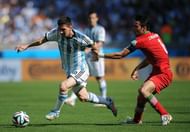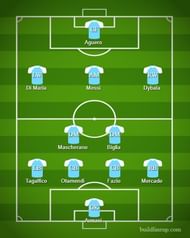#4 Argentina 2014: 4-2-3-1

Sometimes it is the simplest formations that make the most sense. Almost every club in Europe played a 4-2-3-1 at some point in the season, with many relying on the formation exclusively.
Argentina themselves played that exact formation throughout the 2014 World Cup, as they used it to reach the final. An adaption of that formation (shown below) could be the correct move against Nigeria:

A four-man defence featuring Fazio and Otamendi in the centre and Mercado and Tagalfico wide is certainly solid. Moreover, unlike the aforementioned 3-4-1-2, this formation includes a defensive midfield pivot of Javier Mascherano and Lucas Biglia.
Biglia is more solid defensively (and in keeping possession) than Banega and is more likely to ensure that Nigeria don't dominate the midfield.
While using Biglia instead of Banega may result in a less industrious midfield, that is more than offset by the presence of Paulo Dybala. The Juventus forward is one of the most creative players in the World and his genius could help reduce the pressure on Messi. Dybala could stay exclusively in the final third, allowing Messi to roam freely to collect the ball from the midfield.
The collective play-making talents of Messi and Dybala would allow Angel Di Maria and Aguero to run behind the Nigerian defence- thus posing an irresistible attack. Finally, perhaps the biggest advantage of this formation remains its simplicity and familiarity. At a time where there have been reports of players being disenchanted with Sampoali’s muddled tactics, going back to basics may be the best option for Argentina.
Yet, that supposed strength of these tactics may also be its weakness. Argentina used the 4-2-3-1 formation in their first game against Iceland (albeit with different personnel- no Dybala) and still failed to break down the resilient Islanders.
The formation may have grown a little stale with opposition teams likely being aware of how specific Argentinian players (especially Messi) tend to play within this system.
Nigeria certainly will be aware considering they played Argentina at the last World Cup. Furthermore, these tactics may be problematic considering the use of Dybala as a right-winger. The Juventus forward likes to cut in and thus may not provide the requisite width to Argentina’s attack.
In addition, Dybala and Messi have had problems playing together in the past as they tend to occupy similar positions. These issues may continue in such a formation as Dybala’s tendency to cut in is likely to clash with Messi’s role as an attacking midfielder. Despite these problems, Argentina should at least consider 4-2-3-1 because of its clarity.
